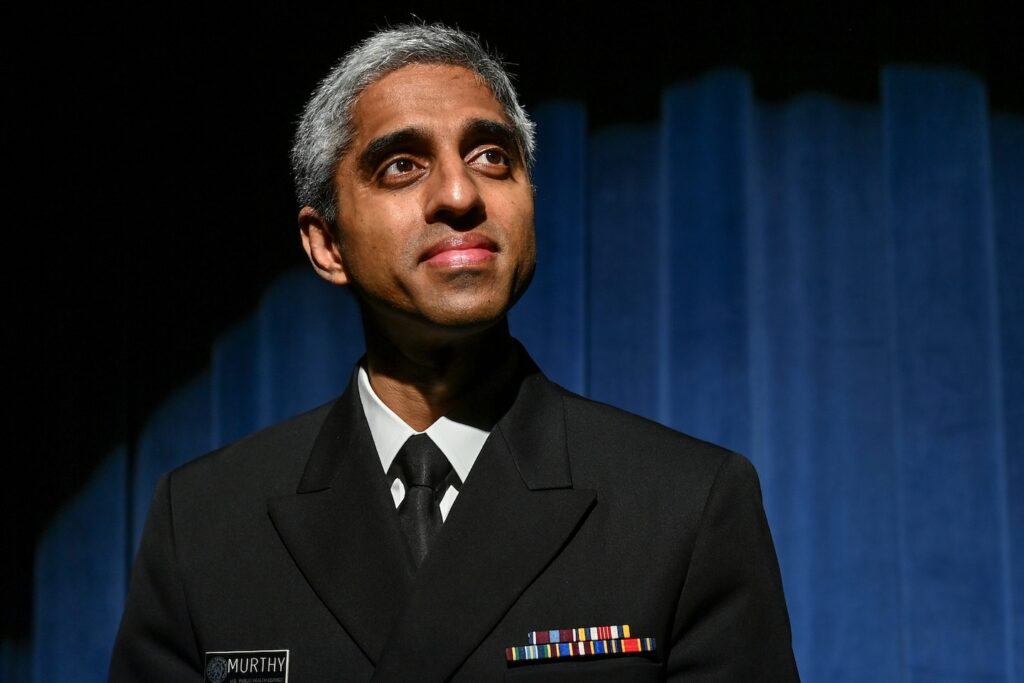U.S. Surgeon General Vivek H. Murthy on Monday called for social media to slap tobacco-like warning labels on users to warn them about the harm the platforms can cause to children's mental health, reinforcing warnings about the influence of online services like Facebook, Instagram and TikTok.
In a New York Times op-ed, Mursi called on Congress to enact legislation requiring social media platforms to include a Surgeon General's warning “to periodically remind parents and adolescents that social media has not been proven safe.”
He cited evidence showing that young people who spend a lot of time on social media are at higher risk of experiencing anxiety and depression, and that many young people say social media has worsened their body image. Murthy said warning labels, like those on tobacco and alcohol products, have been shown to change people's behavior.
The Surgeon General's call for action comes amid increased scrutiny from regulators and lawmakers about the link between social media use and children's mental health, and a flurry of proposals to expand protections for children online. Lawmakers have compared the impact of big tech companies on children to that of big tobacco companies and urged swift action to address what is driving the youth mental health crisis.
But despite the bipartisan outcry, there remains significant debate within the scientific community about the extent to which social media use is causing mental health problems among children and teens. Researchers and public officials have called for increased federal funding for research on the issue and criticized tech companies for not making more of their internal data on the subject available to the public.
Get caught up in
Stories to keep you up to date
But Murthy and other public officials argue that despite the lack of research, there is enough evidence to suggest social media may be unsafe.
“One of the most important lessons I learned in medical school is that in an emergency, we cannot afford to wait for perfect information,” he wrote Monday. Murthy said the label would state, “Social media causes significant harm to adolescent mental health.”
More than a dozen states have passed laws aimed at expanding guardrails for kids' social media use, with some going so far as to ban young children from accessing social media altogether and requiring teens to get parental permission to use social media. But tech industry groups have challenged these laws, arguing they are unconstitutional and infringe on users' free speech rights. Some of the laws have subsequently been blocked by courts.
On Capitol Hill, lawmakers are moving forward with a series of bills that would require social platforms to vet whether their products harm children and expand existing federal protections governing children's online data, but the bills have yet to pass both houses of Congress, leaving lawmakers running out of time to act ahead of the 2024 elections.
“We are pleased that the nation's top doctor, the Surgeon General, continues to focus attention on the harmful effects social media has on children,” Sens. Richard Blumenthal (D-Conn.) and Marsha Blackburn (R-Tenn.), the lawmakers leading the charge on child online safety legislation in Congress, said in a joint statement Monday.
Carl Szabo, vice president and general counsel for NetChoice, a technology trade group, said in an emailed statement Monday that Murthy's proposal “oversimplifies the issue” by failing to recognize that “every child is different and deals with their own challenges.”
“The people who are best placed to address these special needs of kids are parents and guardians, not governments or tech companies,” said Szabo, whose group includes Meta, Google and Amazon (whose founder Jeff Bezos owns The Washington Post).
NetChoice is leading a lawsuit aimed at halting several child online safety laws at the state level.
Shoshana Weissman, digital director and research fellow at the think tank R Street Institute, called Mursi's proposal “worrisome” and argued that US surgeons general have previously spoken prematurely about the dangers of new technologies, including video games, before the science is fully developed.
“That in and of itself does not mean the Surgeon General was wrong, simply that the agency issued periodic warnings that ultimately turned out to be wrong,” Weissman said in an emailed statement.
Murthy said the warning labels are just one part of broader, strengthened rules to track and limit the impact social media has on consumers, all of which require Congress' support.
Murthy said Congressional action is also needed to prevent platforms from collecting sensitive data from children and to restrict features such as push notifications, autoplay and infinite scrolling that lead to excessive use.
Additionally, social media companies should share data on health effects with independent researchers and the public and allow independent safety audits of their products, he wrote.
Some online child safety activists say stricter privacy and consumer protection rules are needed to address the impact of social media on children.
“Warning labels are an illusory safeguard without serious reform,” said Jeff Chester, executive director of the Center for Digital Democracy Advocacy. he said in a social media post on Monday..
Murthy cited a 2019 study that found adolescents who spend more than three hours a day on social media have double the risk of depression and anxiety, as well as statistics showing that adolescents spend an average of 4.8 hours a day on social media.
He compared his proposal to other instances where the federal government has acted to protect consumer health and safety, notably the grounding of Boeing planes in January and the recall of dairy products due to Listeria contamination. He wrote that rules requiring seat belts and airbags were enacted because lawmakers acted to protect people from car crashes.
“Why are we failing to address the harms of social media, which are as urgent and pervasive as those caused by unsafe cars, planes and food?” Murthy asked. “These harms are not the result of failures of willpower or parenting, but the result of unleashing powerful technologies without sufficient safeguards, transparency and accountability.”



